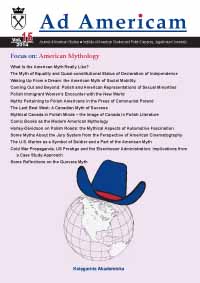Cold War Propaganda, US Prestige and the Eisenhower Administration: Implications from a case study approach
Cold War Propaganda, US Prestige and the Eisenhower Administration: Implications from a case study approach
Author(s): Zinovia LialioutiSubject(s): Politics / Political Sciences
Published by: KSIĘGARNIA AKADEMICKA Sp. z o.o.
Summary/Abstract: Scholarly research in recent years has emphasized the elements of ideology and propaganda in the understanding of the nature and the features of the Cold War. As far as the US was concerned, the importance of cultural diplomacy and propaganda mechanisms grew as the Cold War began to consolidate. The Eisenhower administration elevated government propaganda mechanisms into an indispensable branch of US foreign policy. It is in this context that the present article examines a US government research project on the decline of US “prestige” abroad designed and implemented in 1953. Our aim is to explore the conceptual structure of the research project and its implications based on archival material of the Eisenhower administration. Our assumption is that the development of propaganda techniques was a gradual and evolutionary process associated with the acknowledgement that perceptions of policies may be as important as the policies themselves. Though in an embryonic form, the reports that are examined in the present article try to address complex issues relating to US image in the world and the appeal of Americanism incorporating working assumptions and methodological principles from the rapidly developing at the time social sciences.
Journal: Ad Americam. Journal of American Studies
- Issue Year: 2014
- Issue No: 15
- Page Range: 171-187
- Page Count: 17
- Language: English

